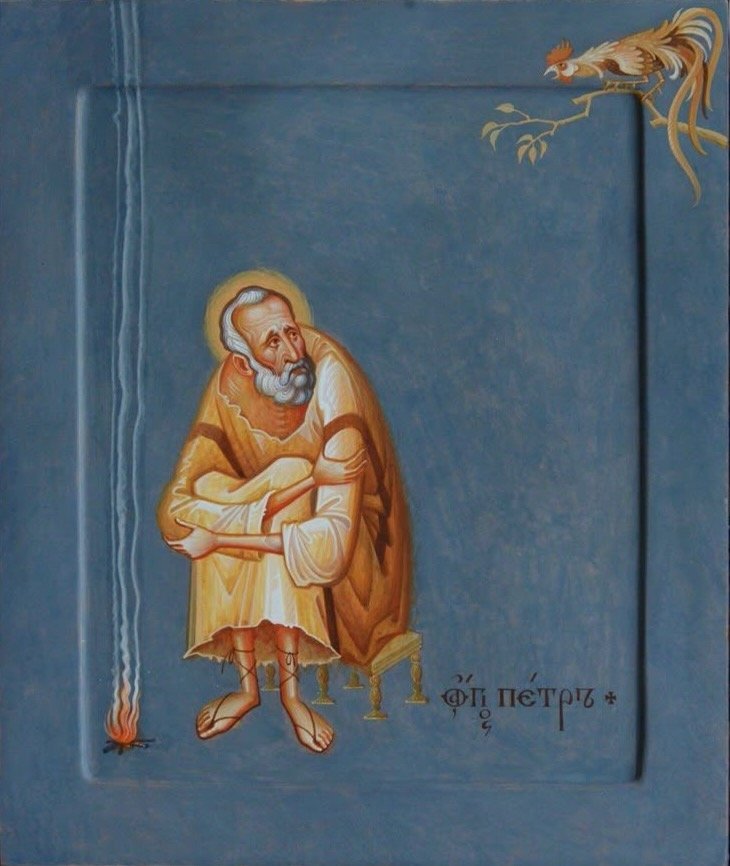Preached on Palm Sunday of the Lord’s Passion (Year C), April 13, 2025, at St. Paul’s Episcopal Church, Seattle, Washington by The Reverend Stephen Crippen
Isaiah 50:4-9a
Psalm 31:9-16
Philippians 2:5-11
Luke 22:14-23:56
Saint Peter, by Oleg Shurkus.
Peter was following at a distance. When they had kindled a fire in the middle of the courtyard and sat down together, Peter sat among them. Then a servant-girl, seeing him in the firelight, stared at him and said, “This man also was with him.”
I have spent a lot of time around the campfire with Simon Peter. This is one of the most compelling moments for me across all four Gospels: poor Peter sitting outside on a chilly spring night, where someone had gotten a fire going. We in Seattle can relate. In the springtime around here, it still gets quite chilly at night. But Peter of course has more than the outside temperature causing him to tremble.
I wonder if you also have found yourself around that dying campfire, at one point or another in your life.
We huddle in vain for warmth as the embers glow. We reflect ruefully on joys departed, on irreparable mistakes, on how, maybe even just days ago, everything was looking up, but now all seems to lie in ruins. And we are not just victims. We are, one way or another, complicit in the crisis.
But there are some consolations. If we are lighting Peter’s campfire here in Seattle at this time of year, then we might find a crocus or two at our feet, here or there in the courtyard. While we stare anxiously into the dying fire, the crocuses push their way up, little cups of dew, colorful flashes of tender mercy, even in the sad reflected glow of our contemplations.
But Peter and I, Peter and all of us — we can’t get any privacy out here in this courtyard, dotted with crocuses. The servant-girl is staring at Peter. Not breaking her gaze, she calls out, “This man was also with Jesus.” Another bystander gives Peter the once-over and determines that he is Galilean — Peter is country, not town. It’s like when Andrew and I were in Paris years ago, and the Parisians could instantly tell that I was an American. They would take one look at me and begin speaking English, presumably because they couldn’t bear to hear me murder their beautiful language. They would look at me. The servant girl stared at Peter.
Peter and I, Peter and all of us — we can’t get any privacy.
But that is how it is out here, out here in the courtyard of public ministry. Whenever we gather as a faith community, we are on view. People can see us. They can see what we do, and what we don’t do. They can see how we spend money, how we treat vulnerable people, how we fill the hours.
For two years now, contractors have been on site here, working on our roof, on our entrances, on our furnaces, on a dozen other things that need fixing. Every once in a while we get a cost break from one of the contractors, a free section of fencing, free items left over from other building jobs, or free plumbing or electrical work. When we ask why they’re being generous, they say, “We see how you walk your talk in this neighborhood.”
That’s flattering, and I am proud of those here who lead us in our powerful urban mission. And yet I also know that people can see our shadows, too. They can see that we are not very racially diverse. They can see that the way we pray demands fluency in English. They can sometimes see when we don’t get along all that well, or when we let each other down, or let our neighbor down.
And of course we can see one another. A newcomer can see whether the longtimers here really want to welcome them. A teenager can see that, too. So can an elder who feels disregarded, patronized, pushed aside. Public ministry is just that — public. When we practice our faith in community, we are seen.
And that brings me to one more person who sees Peter huddling next to me by the fading campfire. “The Lord turned and looked at Peter,” we hear today. That’s it — just a look. Not a stare, like the glaring servant-girl, but an intense look all the same. The Lord says not a mumblin’ word, but that look speaks whole sermons. That look is plenty devastating for Peter, because that look communicates immediately that Jesus knows what Peter did. The courtyard, it turns out, is just steps from where Jesus is being held, from where Jesus dwells. Jesus is close to our courtyard. He knows. He sees. Peter is being watched.
We are being watched.
But I have Good News.
When Jesus looked at his friend in that courtyard, yes, he knew. But he also looked at him with mercy. His terrible gaze devastated Peter, but it also began the repair of their friendship, almost immediately after Peter had broken it. And that is what being Christian is like, too. We are looked at, known, seen. But we are also offered mercy, and grace, and a path back to friendship. And we learn how to offer that to one another. Our courtyard is sad and desolate, full of shadows, our fire collapsing into cold ash. But the crocuses keep pushing up.
Gathered around this dying campfire in the springtime, huddling together for warmth as our Lord turns to look at us, his eyes filled with awareness of our true selves, but also filled with mercy — gathered here together, I hope we can see the crocuses. I will close with a poem by Marion McReady, a poem about crocuses:
Eyelids are the final petals closing on this life.
When I die, place crocuses on my eyes—they will guide me.
I kneel down next to the crocuses, touch them gingerly as if they were puppies
with pin teeth jumping excitedly in the firth breeze.
At last the snow has left us, cleaned the earth for crocuses
luxurious as silky hair or oiled skin.
Don’t be fooled—crocuses are as wild as a fairground wheel
spinning out of control. The crocuses were coughed up out of the ground;
they are scattered around tree trunks like residue from a terrible accident.
They are purple tears hand-sewn to the earth.
We are all survivors in this life, but none more so than the crocus
embedded in the grass like a microchip gathering the history of the world.
Crocuses are submarines moving silently through green waves.
The crocuses seem to be melting among snowdrops like ice cream
with the wet look of a frog; their orange tongue-pistils barely visible.
Crocuses are satellites in the grass watching us, they know us
better than we know ourselves. Look to the crocus.
Do not stand on the purple crocus, it will remember your footprint;
like elephants—they never forget. The crocus beckons like homemade liqueur—
each one a glassful of sunlight. The crocus is a soft word in my ear;
the crocus is my best self. I carry them around in my head like a song.
I want to crawl inside of their purple armor—dwell in the honeyed saffron
filaments at their center. Thank God when the final curtain falls
it is made of crocuses.

